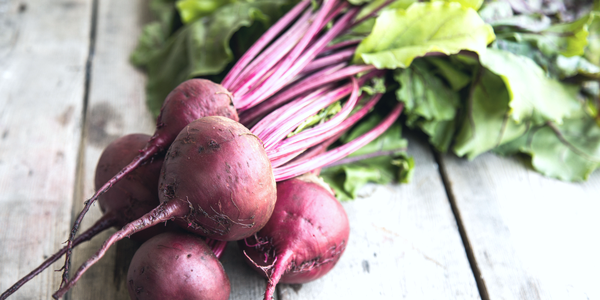
Beets are a bright, versatile root vegetable that can be enjoyed raw, boiled, canned, roasted, fermented, or pickled. They have special properties that may offer heart and brain health benefits and may even positively affect athletic performance.
Beets are rich in many nutrients, making the benefits of beets worth knowing. Find out just why beets are good for you and how to add them into a balanced diet!
What Are Beetroots?
Beetroots belong to the Amaranthaceae plant family which also includes Swiss chard and sugar beets that are cultivated to make table sugar. Beets are grown for consumption of their roots, but their leafy tops can also be consumed.
Beets are traditionally a deep red but can also range in colors including purple, pink, striped white with red, gold, and white.
Beet Caution to Know
While beets are considered a healthy, safe food (beets nutrition facts below), one may notice some benign side effects when eating more beets. Urine color may change to a pink or red tone depending on how much is ingested, but health experts suggest this is not anything to worry about.
Those trying to limit oxalates in the diet may need to limit beets and other oxalate-containing vegetables.
Beet Nutrition Facts
Are beets good for you? Absolutely. Beets are naturally low in calories, fat-free, and a source of fiber, vitamins, and minerals.
Nutrition facts for one cup of beets include the following:
• 59 calories
• 12% daily value (DV) potassium
• 13 grams carbohydrate (4% DV)
• 3.8 grams of fiber (15% DV)
• 2.2 grams of protein
• 2% DV calcium
• 11% DV vitamin C
• 6% DV iron
• 5% DV vitamin B6
• 7% DV magnesium
Do not forget about the green tops of beets, either! Beet greens are highly nutritious, as they provide many B vitamins, fiber and have more iron than spinach. These slightly bitter greens can be used like other leafy greens as a mixed salad base or lightly sauteed like kale or Swiss Chard.
4 Health Benefits of Beets
Research studies have shown beets, specifically with the deep red color from betalains, provide many health benefits.
1. Antioxidant Source
Like other vegetables, beets offer a variety of phytochemicals that act as antioxidants in the body. However, an antioxidant unique to beets is a compound called betalains. These betalains compounds in beets have been shown to be powerful antioxidants in research studies.
Betalains may offer protection against various chronic diseases, certain types of cancer and help fight inflammation.
2. Lower Blood Pressure
Beets are a natural source of dietary nitrates. When nitrates from beets are broken down in the body, nitric oxide is released. This nitric oxide impacts blood vessels by helping them dilate. When blood vessels dilate, blood pressure drops.
Beets offer another way of helping to lower blood pressure by being a source of potassium and magnesium. These combined nutrients are a main reason beets have been shown to help lower blood pressure.
3. Brain Function
The same nitric oxide that can have a positive effect on blood pressure can also positively affect brain function. Cognitive decline can naturally occur with age. One reason for cognitive decline is blood flow to the brain naturally goes down as we age. The nitric oxide released in the body from beets may help improve blood flow to the brain which may in part help fight against age-related cognitive decline.
One study with older participants (~67 years) with type 2 diabetics found those who supplemented with 250 milliliters of beetroot juice (nitrate: 7.5 mmol) for 14 days had a significant improvement in simple reaction time compared to a control group> More research is ongoing to further understand the impact of beet nutrients on brain function.
4. Athletic Performance
Can eating beets or drinking beet juice help one run faster or get stronger? Some athletic performance supplements with beets or betalains may make such claims. There is also research to suggest beets may potentially have a benefit for exercise.
A 2016 study had male subjects consume 50 milligrams (mg) of a betalain supplement or control before 30 minutes of treadmill running (77 ± 4% VO2max) followed by a 5-km time trial. Researchers found the betalain-rich supplement helped improve the 5 km time compared to the control. A 2016 study with triathletes found similar results with improved performance with betalain supplement and improved athletic performance.
Beetroot juice is also a common supplement and way to get the antioxidant and nitric oxide effects of boosting athletic performance. While most, but not all, studies have shown beetroot may have a beneficial role on muscles during exercise, more research is needed for suitable dosage and long-term safety.
Eating whole beets is a healthy, balanced way to get all the health benefits. However, keep in mind eating them before a run may not automatically translate to a faster time.
11 Recipes for Beetroot
Beets can be used in a variety of not just savory but also sweet recipes. They can be used raw, cooked, or fermented.
Keeping cooked beets on hand in the refrigerator is an easy way to add them to numerous recipes already used. Experiment with different colors of beets to reap the full array of benefits of beets.
1. Beets in Salads
Roasted beets can be a delicious, colorful addition to a salad. They tend to pair well with ingredients like butternut squash, pears/apples, goat cheese, or walnuts.
However, they can really be added to any grain or green-based salad!
2. Beet Hummus
Prepare beet hummus by simply adding in one or two chopped, cooked beets. The outcome is a natural beautiful pink or red hummus!
3. Roasted Beets
Roasting beets is a great way to soften them up and enjoy immediately warm out of the oven or later from the refrigerator for an easy addition to another meal.
Roasting beets captures their earthy flavor and can be made easily by washing, peeling, and chopping beets up to put in the oven. Also add seasonings as desired when roasting like Italian seasoning, zaatar, or just salt and pepper.
4. Berries and Beets Recipes
Because of their deep red color, beets can be used with berries in many ways. For example, this simple berry and beet sauce combines beets and berries for a sauce that can be used to top oatmeal, yogurt, or ice cream.
Feel free to combine berries with beets in baked goods like pies, tarts, or blueberry beet muffins.
5. Beet Brownies
Enjoy the health benefits of nitric oxide from both beets and cocoa when making brownies with a beet puree. Like applesauce, a beet puree can be used as a replacement for oil in a brownie recipe. This sneaky beet brownie recipe is refined flour and sugar-free.
6. Beet Red Velvet Cake (or Cupcakes)
Beets can be used in place of artificial red color in desserts like red velvet cupcakes. Not only does using beets mean no need for artificial coloring but also get the benefit of added fiber, minerals, and antioxidants from beets in a delicious cake or cupcake form.
7. Beet Juice
Have a juicer on hand? Not only eat beets but drink them too!
Beet juice can provide many of the same health benefits as eating beets (minus the fiber). Beets can have an earthy flavor, so if that is not appealing, juice other fruits and vegetables with beets to get a flavor you like.
8. Beet Soup
Borscht, or beet soup, is common in Eastern European cuisines. It can simply be made from sauteing onions, garlic, diced beets, and then simmered in beef stock. The soup is then blended to a smooth consistency.
If looking for a spicier beet soup option, give curried beet soup a try.
9. Pickled Beets
Beets can be pickled like any other vegetable and can be served as a condiment to burgers, sandwiches, garnish or in salads.
10. Beet Fritters
Making beet fritters from fresh beets can be possible with a vegetable grater and a heavy skillet for frying. (Just note after grating beets your hands may be purple for a day or two!) These fritters can be served as a main or side dish and topped with plain Greek yogurt and fresh herbs.
11. Beet Smoothies
Like berry desserts, beets can also be added to almost any berry-based smoothie or smoothie bowl. For example, this beet and berry smoothie has just chopped raw beets, frozen berries and apple juice.
Summary
There are many reasons why beets are good for you. Beets are a good source of fiber, minerals, and antioxidants including betalains that give the deep red color to beets.
Beets can help lower blood pressure, increase blood flow to the brain, and power muscles during exercise. Beets can be used in a variety of recipes and can be added to many sweet and savory dishes.
References:
Clifford T, Howatson G, West DJ, Stevenson EJ. The potential benefits of red beetroot supplementation in health and disease. Nutrients. Published April 14, 2015.
Gilmerm. The Health Benefits of Beets. Health Essentials from Cleveland Clinic. Published December 28, 2020. https://health.clevelandclinic.org/the-health-benefits-of-beets/.






